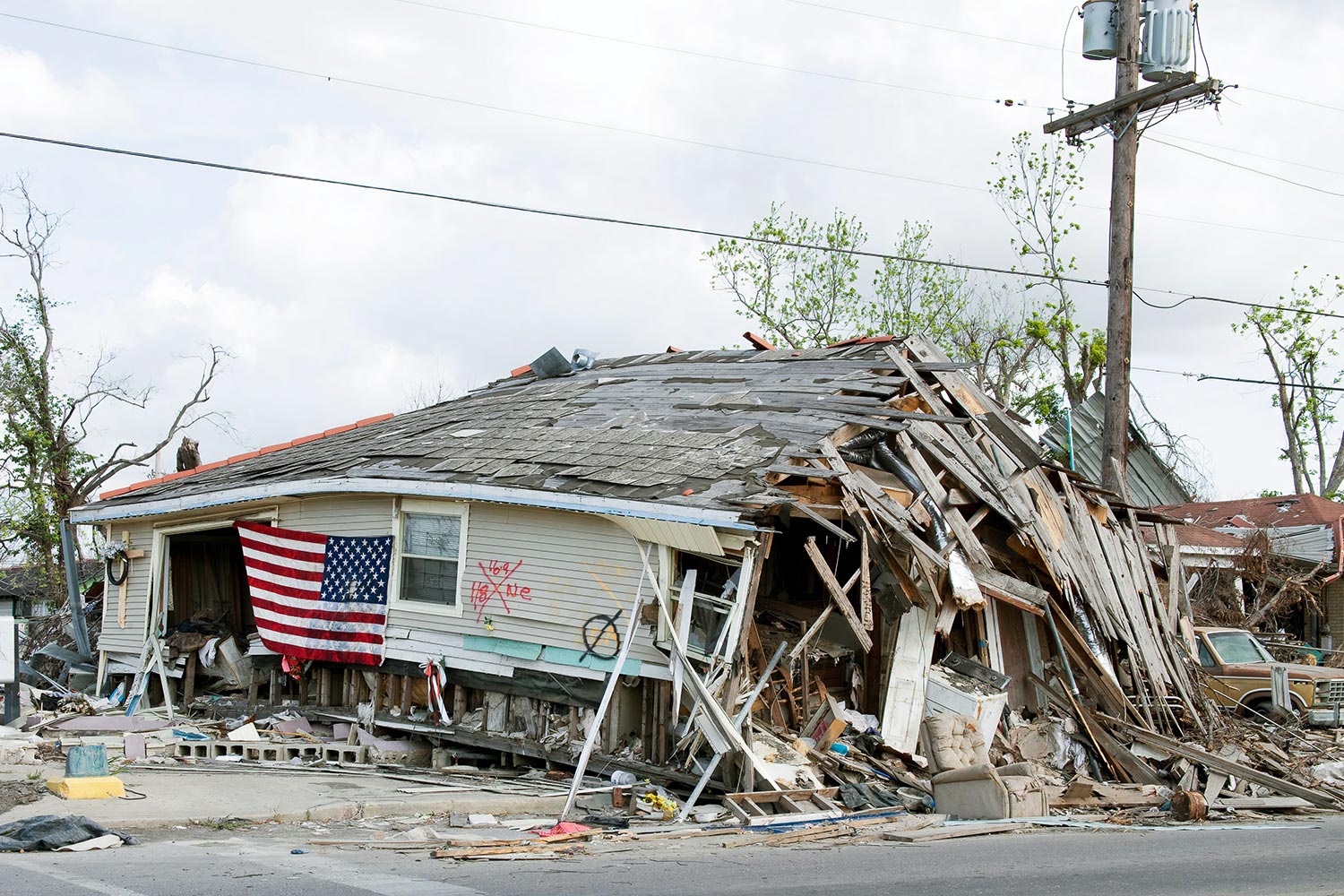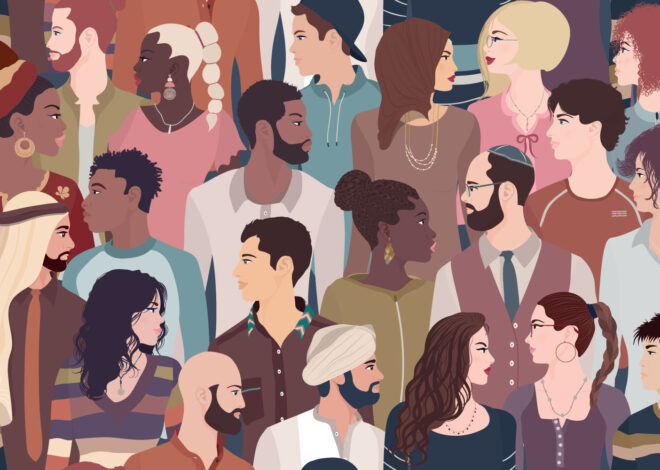Community Nonprofits: Katrina’s Unsung Heroes Still on the Job
After Hurricane Katrina, Mississippi community nonprofits used the region’s recovery as a stepping stone to lasting social change.

When Hurricane Katrina struck, help came from the ground up.
“This disaster has woken us up in Mississippi,” says Derrick Johnson, state president of the NAACP. “This is our one chance to sit down with all the decision makers and say what our needs and dreams are.”
Profound challenges will dog the region for years to come. But in the aftermath of both the natural and the man-made devastation, the Mississippi Gulf Coast may be witnessing the beginning of the end of generations of marginalization. With the adoption of fruitful approaches to community work and with the influx of young newcomers, some residents see a better Mississippi in the offing.
Hurricane Katrina’s 30-foot waves landed on the coast on August 29, 2005. The damage was staggering: levees and power lines collapsed, bridges fell and 65,000 homes in outlying rural areas and coastal towns such as Bay St. Louis, Biloxi, Gulfport, Pass Christian, Waveland, and many others were completely destroyed. The storm damaged another 134,000 homes. It stranded thousands of people without food, water, or shelter.
When disaster struck, help came from the ground up.
Collette Washington, a single mother on disability, credits community groups with helping her to end an unimaginable string of personal disasters set in motion by Katrina.
A Devastating Chain of Events
“In January 2005 I purchased and moved into my first home in Pass Christian ,” she told Blue Avocado. “In August Katrina came and I lost it all. I even had wind and storm insurance, but my house was destroyed and the company wouldn’t pay for the wind damage. I was one of the lucky ones because my three sons and I found an apartment but of course there was no electricity and no water. The rent was $550 until the landlord realized that people were desperate and he raised the rent to $950.”
Things went downhill from there. She lived in substandard housing provided by the Federal Emergency Management Agency (FEMA), suffered continuing health setbacks, and lost the government loan she got for a new house to a crooked contractor.
“Things started to change when the Mississippi Center for Justice (MCJ) invited me to a meeting,” she says. “Everyone there had been evicted, or had no place to go or was ripped off like me.”
With the help of MCJ, a nonprofit law firm that focuses on racial and economic justice issues, Collette was able to have the unlicensed contractor arrested; his trial is pending. Reilly Morse, a third generation Gulfport lawyer, signed on with MCJ and opened a coastal office to pursue the legal rights of poor displaced coastal residents after his own office was destroyed. Along with fellow MCJ lawyers and law student volunteers from across the nation, he traveled the coast meeting with residents displaced first by storm damage and threatened again by rising rents. (Reilly Morse and James Cromwell are photographed here.)
MCJ is one of a constellation of nonprofit groups that have stepped in to address housing, legal and other problems faced by Gulf Coast residents.
“Churches and community groups are the unsung heroes of this disaster,” notes Bill Bynum, president of Enterprise Corporation of the Delta (ECD), a nonprofit financial empowerment organization for low-income Mississippians that is the largest economic developer in the state.
Community groups stepped in immediately. Bill points to James Crowell, director of the Biloxi NAACP, and NAACP leader Derrick; they organized a 22-site delivery system of food, water and clothes in East Biloxi when FEMA failed to show up.
Bill’s own organization moved quickly to offer long-term financial counseling to homeowners. ECD is also producing modular housing, an innovative and needed affordable housing resource, and has established the Mississippi Economic Policy Center, a resource for data and analysis about the availability and use of public funding.
‘We Know the Landscape’
“ECD has been a community development financial institution (CDFI) since 1994 in the most distressed areas of the South,” he says. “We know the landscape and the people and have the experience and capacity to do this work.”
When James talks about life after Hurricane Katrina he talks in equal measure about frustration and hope. He remembers the economic boom in the seven years before Katrina, the outcome of a growing casino and hotel industry following years of scarcity in the grueling fishing trade.
“Black, Vietnamese, all of our people work so hard,” he recalls. Now there is only one casino open and one hotel which houses FEMA workers. The poorest state in the nation, Mississippi’s philanthropic and nonprofit infrastructure had been fragile before Katrina landed. In contrast to neighboring Louisiana’s more robust charitable giving environment, Mississippi has fewer community foundations and smaller grant amounts to rely on. Its state association for nonprofits has only a fraction of the staff and membership of its Louisiana counterpart. And although the state is imbued with a rich civil rights history, it lacks a destination city such as New Orleans, whose high profile garners significant media, charitable and celebrity attention.
Stepping Forward in Coalition
But FEMA’s botched response on the Gulf Coast inspired area nonprofits to launch the Steps Coalition in 2006. Coalition members take a broad view of community development. They see the intersection of affordable housing, economic justice, environmental justice, preservation of historical communities and human rights as critical to the equitable rebuilding of Mississippi. Members including the NAACP, ECD, MCJ, Boat People SOS, Powerhouse of Deliverance, Gulf Coast Latin American Association, Oxfam, Mercy Housing, North Gulfport Community Land Trust and Mississippi Immigrant Rights Alliance are shaping and implementing a vision for moving forward.
Policy expert Roland Anglin is positive about the resurgence of activism in Mississippi. “We are creating opportunities for new players and that is changing life for people on the ground. The process may look messy but we are learning from it. There is a big audacious vision here of the political inclusion of marginalized communities. The work of the Steps Coalition is moving Mississippi in that direction,” he says. Anglin heads the New Jersey Public Policy Research Institute and serves as a consultant to the Funders Forum for Sustainable Gulf Coast Transformation, a network that includes the Ford, Rockefeller and Annie E. Casey foundations.
“We advocate for renters, who receive no [Katrina-related] assistance and whose rents are now too high to pay,” says the NAACP’s James, a coalition member. “And we advocate for people with wind damage who can’t get paid even when they had insurance. The next goal is to build a grassroots movement that can speak with authority about how to rebuild in a fair and equitable way. FEMA is removing its trailers and cottages in March. Our hospitals have left the area. What Katrina didn’t dismantle, corporations and government are letting go. We have to be prepared.”
MCJ’s Reilly explains, “Our collaboration with other nonprofits is making a difference. Five years ago there was no real nonprofit infrastructure here. Nonprofits did good work but we rarely worked together. Now we’ve learned how to bring different approaches to the table and make a positive impact in the community. We can deliver services and shape public policy.”
Analyzing and Developing Policy
He and Derrick use the Mississippi Policy Center’s “unimpeachable data “to support recommendations to state and federal policy makers, including a reexamination of the state’s rental housing problems. For instance, 42,000 single family rental units were severely damaged by the storm but the state’s plan replaces only 6,000 units. The coalition’s ability to document the problem has positioned rental housing on the state’s recovery agenda.
Steps has moved aggressively to hold public officials accountable for their promises and decision making. After Congress granted Mississippi Governor Haley Barbour’s request to waive a central requirement of community development block grants (CDBGs), Reilly and Derrick testified in protest. CDBGs fund affordable housing, antipoverty and infrastructure development programs.
Although states and localities have discretion about spending these grants, they must normally use half of the funds for low-income communities. The governor proposed diverting $600 million – 23 percent of the allocated $5.4 billion in emergency CDBG funds – from affordable housing development to the expansion of the port of Gulfport. Steps members argued that this would undermine recovery efforts and lead to environmental degradation in an adjoining African American neighborhood. The testimony before the Housing and Community Opportunity Subcommittee of the Financial Services Committee generated hard-hitting support from 12 key members of Congress, including committee chair Rep. Barney Frank (D-Massachusetts) and Rep. Maxine Waters (D-California), chair of the subcommittee.
The End of Acquiescence
The Steps Coalition leaders and organizations are rebuilding for the long haul. [Click here for their recent Report Card on Mississippi rebuilding.] They know that they have seen the end of acquiescence on the Gulf Coast. Reilly praises the law students who came from all around the country to help displaced families.
“When all is said and done,” adds Roland Anglin, “many talented people came and stayed. They are going to school, working in the mayor’s office, and working for nonprofits. For many young people, this is their civil rights movement. Many people here felt invisible. They have been touched by the generosity from so many people who came to help.”
The community groups’ effort “means so much to me,” Collette says. “The Back Bay Mission Church comes every day with volunteers and help. I am so grateful to them all.” Now, she adds, “Mississippi is coming back.”
By working together to secure resources and policy changes, Gulf Coast organizations are rebuilding lives and communities. And they are developing a nonprofit infrastructure that had barely existed before the hurricane, sparking a movement that is revitalizing more than broken neighborhoods.
About the Author
Anne Pasmanick, a community development consultant in Washington, D.C., has worked in the field for more than 20 years. She also volunteers at N Street Village, which provides services for homeless women.
Articles on Blue Avocado do not provide legal representation or legal advice and should not be used as a substitute for advice or legal counsel. Blue Avocado provides space for the nonprofit sector to express new ideas. Views represented in Blue Avocado do not necessarily express the opinion of the publication or its publisher.












Good article about MS. Wanted to add another organization doing amazing work there – Turkey Creek Community Initiatives (TCCI). Website is www.tcci.org. There is also a film in process about Turkey Creek, a community founded by freed slaves who were fighting to save their homes from Gulfport’s expansion plans for big box stores and casinos before the setback of Katrina. Website: www.turkeycreekproject.org.
i remember that mississipi was torn apart,
but the media was so focused on new orleans